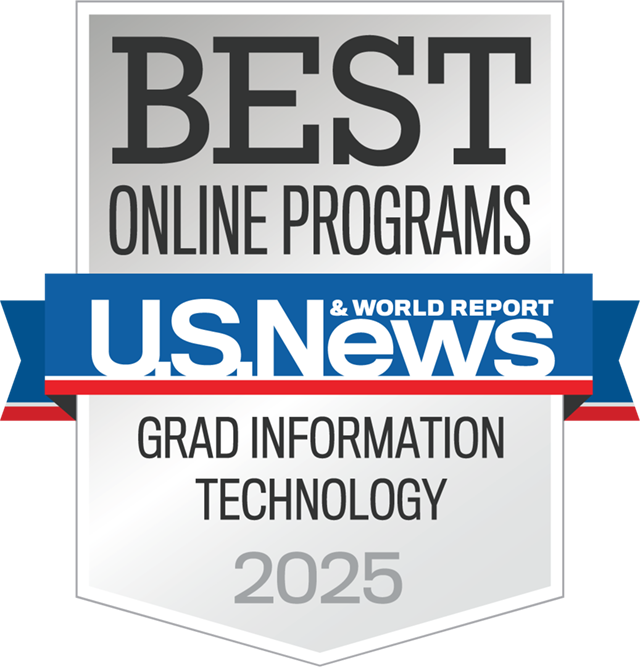100% Online
Complete your Penn State course work at your own pace and 100% online.
Application deadline
Credits and costs
Nationally Recognized

Expand In-Demand Skills and Knowledge in Computer and Information Science
Understand present and future information needs of organizations and identify solutions to seamlessly integrate technology across multiple business functions.
Apply known and emerging information systems theories and principles to improve and enhance an organization’s operational efficiency.
Design, create, and maintain practically viable solutions to support information retrieval, data analysis, and decision-making.
Lead teams and projects, communicate effectively, and make informed decisions based on sound legal and ethical principles.
Identify security concerns associated with organizational information assets and determine effective solutions to protect them.
Implement and oversee information systems and networks while protecting sensitive information assets.
Online Master's in Information Science Courses
Online Master's in Information Science Courses
As a student in this online information science master’s degree program, you will have the opportunity to master emerging theories and technologies in the field. You'll also research and study solutions to transform enterprise systems to meet the needs of ever-changing business operations.
The courses in this MSIS degree program emphasize data-driven IT and will help you acquire the knowledge and skills needed to meet evolving challenges of integration, security, and business continuity. You can select core and elective courses to fit your interests and professional goals. Course subjects include:
- information system architecture
- big data and emerging information technologies
- cybersecurity and information protection
- enterprise solution design
- enterprise digital transformation
You must also successfully complete INSC 594, a 3-credit integrative research topics course that includes a master's scholarly paper.
You can earn up to three related graduate certificates along the way to your master's in information science. Students who plan to take the stackable credentials pathway to this degree should follow the course lists for each graduate certificate program. To earn each certificate, you must apply, gain acceptance to the program, and complete the required courses.
- Graduate Certificate in Business Process Integration (9 credits)
- Graduate Certificate in Cyber Threat Analytics and Prevention (12 credits)
- Graduate Certificate in IT Analytics (9 credits)
Students who are not pursuing stackable credentials can follow the full course list for the program:
Required Courses (18 credits)
- 3credits
Design and development of business processes that align business objectives with Information Technology (IT) systems.
- 3credits
This course will explore various emerging theories and technologies in information science, including at least cloud computing, mobile application, Internet of things, blockchain, machine learning, and artificial intelligence.
- 3credits
A web-centric look at the latest techniques and practices in computer security as they apply to the internet.
- Prerequisite
CSE 453 or IST 815
- 3credits
Advances in design, development, and deployment of control and management software for enterprise and production information systems.
- 3credits
This course will investigate the evolution of information systems architecture.
- 3credits
Practical benefits of data mining will be presented; data warehousing, data cubes, and underlying algorithms used by data mining software.
- Prerequisite
INSC 521, or approval of instructor or department
Electives (select 12 credits)
- 3credits
Examination of large-scale data storage technologies including NoSQL database systems for loosely-structured data, and warehouses for dimensional data.
- 3credits
This course will explore the development of analytics systems and the application of best practices and established software design principles using the Python programming language and its several toolkits.
- Prerequisite
STAT 500
- 3credits
This course provides a foundation in the principles, concepts, techniques, and tools for visualizing large data sets.
- 3credits
Application and interpretation of analytics for real-life decision-making.
- Prerequisite
STAT 500
- 3credits
The course examines business intelligence in the era of big data. Emphasis is on the successful implementation of big data in large and small corporations that deliver extraordinary results.
- 3credits
Survey course on the key topics in predictive analytics. Students will learn methods associated with data analytics techniques and apply them to real examples using the R statistical system.
- Prerequisite
STAT 500 or equivalent
- 3credits
The requirements capture, design, and development of relational database applications; analysis of business requirements and development of appropriate database systems.
- 3credits
This course will employ several methods and measures from the area of social network analysis to study the interrelatedness of cyber-social and cyber-technical aspects of an organization or the society as a whole to detect and capture the dynamic patterns of group membership and structure. This type of analysis can be useful in uncovering potential threats and attacks and predicting criminal behavior and evolution of criminal networks.
- 3credits
Descriptive statistics, hypothesis testing, power, estimation, confidence intervals, regression, one- and 2-way ANOVA, Chi-square tests, diagnostics.
Culminating Experience (3 credits)
- 3credits
Supervised student activities on research projects identified on an individual or small-group basis, leading to M.S. scholarly papers.
Course Availability
If you're ready to see when your courses will be offered, visit our public LionPATH course search (opens in new window) to start planning ahead.
Advance Your Career

Advance Your Career
You can use the knowledge gained from this program and the support of Penn State career resources to pursue careers in a variety of fields, depending on your goals.
Job Titles Related to This Degree
The program is designed for mid-level information technology professionals who want to improve their skills, increase their knowledge, and move into a leadership or management position within the IT field. As a student in this program, you can gain a competitive edge in your field and deepen your understanding of IT.
This degree can prepare you for any number of professional roles in business, health care, finance, nonprofits, military, and government. The following roles are often held by people with this type of degree:
- Application Development Director
- Computer Systems Analyst
- Computing Services Director
- Information Technology Director (IT Director)
- IT Project Manager (Information Technology Project Manager)
- Solutions Architect
Employment Outlook for Occupational Fields Related to This Degree
Estimates of employment growth and total employment are provided by the U.S. Bureau of Labor Statistics and are subject to change. While these occupations are often pursued by graduates with this degree, individual outcomes may vary depending on a variety of factors. Penn State World Campus cannot guarantee employment in a given occupation.
Computer and Information Systems Managers
Computer Systems Analysts
Career Services to Set You Up for Success

From the day you're accepted as a student, you can access resources and tools provided by Penn State World Campus Career Services to further your career. These resources are beneficial whether you're searching for a job or advancing in an established career.
- Opportunities to connect with employers
- Career counselor/coach support
- Occupation and salary information
- Internships
- Graduate school resources
What to Expect
Complete this form to download a brochure and stay informed on upcoming events, application deadlines and requirements, and other important program information.
Ready to take the next step toward your Penn State master's degree?
Costs and Financial Aid
Costs and Financial Aid
Learn about this program's tuition, fees, scholarship opportunities, grants, payment options, and military benefits.
Costs and Financial Aid
Graduate Tuition
Graduate tuition is calculated based on the number of credits for which you register. Tuition is due shortly after each semester begins and rates are assessed every semester of enrollment.
2024–25 Academic Year Rates
| How many credits do you plan to take per semester? | Cost |
|---|---|
| 11 or fewer | $1,027 per credit |
| 12 or more | $12,325 per semester |
2025–26 Academic Year Rates
| How many credits do you plan to take per semester? | Cost |
|---|---|
| 11 or fewer | $1,037 per credit |
| 12 or more | $12,448 per semester |
Financial Aid and Military Benefits
Some students may qualify for financial aid. Take the time to research financial aid, scholarships, and payment options as you prepare to apply. Federal financial aid may only be used to pay for credits used to satisfy program requirements.
Military service members, veterans, and their spouses or dependents should explore these potential military education benefits and financial aid opportunities, as well.
Additional Cost of Attendance Details
To view the detailed list of cost of attendance elements:
- visit the Tuition Information site
- click the plus sign to expand the table
- select a semester from the World Campus row
Technical Requirements
Review the technical requirements for this program.
Earn Stackable Credentials on the Way to Your Degree

Earn Stackable Credentials on the Way to Your Degree
Earn graduate certificates while you work toward your degree. It’s a great way to quickly gain new skills and add valuable credentials to your résumé — without any additional course work, course fees, or application fees.
Finish the following three certificate requirements and the 3-credit capstone course, and you will have completed the requirements to earn your information science master's degree. Please note that you must apply and be accepted to each program on an individual basis, but you will not be charged application fees for any program beyond the first.
Complete All of These Certificates (30 credits)
Learn to analyze, architect, design, implement, and manage the technical aspects of an enterprise IT system to meet business objectives. Explore the latest theories in information science, including cloud computing, blockchain, machine learning, and more.
Learn more about the Graduate Certificate in Business Process IntegrationEnhance your understanding of cyber threat attacks, laws, analytics, and terrorism, as well as network vulnerabilities, system threats, and surveillance protocols with the courses in this online graduate certificate program.
Learn more about the Graduate Certificate in Cyber Threat Analytics and PreventionGain the predictive analytics skills needed to design, build, and monitor IT infrastructure to effectively support business operations. Learn by working with real-world data using the R statistical system and Python programming language.
Learn more about the Graduate Certificate in IT AnalyticsComplete the Capstone Course (3 credits)
After the certificate requirements have been met, you just need to complete the 3-credit capstone course to finish the master's.
Set Your Own Pace

Set Your Own Pace
Whether you are looking to finish your program as quickly as possible or balance your studies with your busy life, Penn State World Campus can help you achieve your education goals. Many students take one or two courses per semester.
Our online courses typically follow a 12- to 15-week semester cycle, and there are three semesters per year (spring, summer, and fall). If you plan to take a heavy course load, you should expect your course work to be your primary focus and discuss your schedule with your academic adviser.
To Finish Your Certificate in One to Two Years
- Take 3–4 courses each semester
To Finish Your Certificate in Two or Three Years
- Take 2 courses each semester
To Finish Your Certificate in Three or Four Years
- Take 1 course each semester
Timelines may vary based on course availability.
Convenient Online Format
This program's convenient online format gives you the flexibility you need to study around your busy schedule. You can skip the lengthy commute without sacrificing the quality of your education and prepare yourself for more rewarding career opportunities without leaving your home.
A Trusted Leader in Online Education

Penn State has a history of more than 100 years of distance education, and World Campus has been a leader in online learning for more than two decades. Our online learning environment offers the same quality education that our students experience on campus.
Information for Military and Veterans

Are you a member of the military, a veteran, or a military spouse? Please visit our military website for additional information regarding financial aid, transfer credits, and application instructions.
How to Apply to Penn State

How to Apply to Penn State
Apply by July 20 to start August 25
Application Instructions
Deadlines and Important Dates
Complete your application and submit all required materials by the appropriate deadline. Your deadline will depend on the semester you plan to start your courses.
Fall Deadline
Apply by July 20 to start August 25Spring Deadline
Apply by November 20 to start January 12Summer Deadline
Apply by April 20, 2026, to start May 18, 2026
Steps to Apply
For admission to the J. Jeffrey and Ann Marie Fox Graduate School, you must hold either (1) a baccalaureate degree from a regionally accredited U.S. institution or (2) a tertiary (postsecondary) degree that is deemed comparable to a four-year bachelor's degree from a regionally accredited U.S. institution. This degree must be from an officially recognized degree-granting institution in the country in which it operates.
GPA and Test Scores — All applicants are expected to have earned a junior/senior grade-point average of 3.0 or higher.
Students intending to earn the MSIS should hold a bachelor's degree in information systems, information science, or another quantitative, scientific, or business discipline. Those with experience in information technology will also be considered for admission to the program.
If the admissions committee determines an area of weakness or insufficient baccalaureate preparation, the student may be required to take one pre-program requirement course (IST 140). The pre-program requirements do not count toward the 33-credit program total.
You will need to upload the following items as part of your application:
Official transcripts from each institution attended, regardless of the number of credits or semesters completed. Transcripts not in English must be accompanied by a certified translation. If you are a Penn State alum, you do not need to request transcripts for credits earned at Penn State but must list Penn State as part of your academic history.
Test Scores — GRE/GMAT scores are not required and will not be accepted.
English Proficiency — The language of instruction at Penn State is English. With some exceptions, international applicants must take and submit scores for the Test of English as a Foreign Language (TOEFL) or International English Language Testing System (IELTS). Minimum test scores and exceptions are found in the English Proficiency section on the Fox Graduate School's "Requirements for Graduate Admission" page. Visit the TOEFL website for testing information. Penn State's institutional code is 2660.
Reference (1) — You will need to initiate the process through the online application by entering the name, email address, and mailing address of one (1) reference. Upon submission of your application, an email will be sent to your reference requesting they complete a brief online recommendation regarding your commitment to success in an online program. Please inform your reference that they must submit the form in order for your application to be complete.
Program-Specific Questions/Materials
Résumé — Upload your résumé to the online application.
Statement of Purpose — Provide a one-page written statement of intent, highlighting academic background, work experience, skills, strengths, academic interests, and professional goals.
You can begin your online application at any time. Your progress within the online application system will be saved as you go, allowing you to return at any point as you gather additional information and required materials.
To begin the online application, you will need a Penn State account.
Create a New Penn State Account
If you have any problems during this process, contact an admissions counselor at [email protected].
Please note: Former Penn State students may not need to complete the admissions application or create a new Penn State account. Please visit our Returning Students page for instructions.
If you have been previously accepted to a program with stackable credentials, you will not be charged an additional application fee for any associated programs.
Associated programs in the information science stack:
Degree
- Master of Science in Information Science
Certificates
- Graduate Certificate in Business Process Integration
- Graduate Certificate in Cyber Threat Analytics and Prevention
- Graduate Certificate in IT Analytics
If you begin with a certificate and are interested in pursuing the Master of Science in Information Science program, work with your adviser while completing your first certificate to determine which program to apply to next.
Up to 15 credits earned in any of these certificate programs may be transferred to the master's degree in information science, subject to restrictions outlined in GCAC-309 Transfer Credit.
You can begin your online application at any time. Your progress within the online application system will be saved as you go, allowing you to return at any point as you gather additional information and required materials.
- Choose Enrollment Type: "Degree Admission"
- Choose "WORLD CAMPUS" as the campus
Checking Your Status
You can check the status of your application by using the same login information established for the online application form.6. Complete the application.
Admissions Help
If you have questions about the admissions process, contact an admissions counselor at [email protected].
Contact Us

Contact Us
Have questions or want more information? We're happy to talk.
To learn more about the Master of Science in Information Science, please contact:
For questions about the program:
Robin G. Qiu, Ph.D.
Professor of Information Science
[email protected]
For general questions about Penn State World Campus:
World Campus Admissions Counselors
Phone: 814-863-5386
[email protected]
Learn from the Best
Learn from the Best
The Master of Science in Information Science is offered in partnership with the Penn State Great Valley School of Graduate Professional Studies. Our courses are taught by distinguished faculty who have special training and experience teaching in an online environment.
Faculty
Youakim Badr
- DegreeH.D.R., University of Lyon
- DegreePh.D., Computer Science, National Institute of Applied Sciences (INSA-Lyon)
- DegreeM.S., Mathematical Modeling and Scientific Software Engineering, Francophone University Agency
- DegreeM.S., Computer Science, Lebanese University
- DegreeB.S., Computer Science, Lebanese University
Dr. Youakim Badr, professor of data analytics, teaches courses in analytics programming, analytics systems design, data mining and predictive analytics. His research interests include smart service computing, IoT, information security, big data, machine learning, and built-in analytics. Dr. Badr is a professional member of IEEE, a lifetime member of ACM, and associate member of the ACM special interest group on knowledge discovery and data mining (SIGKDD).
Adrian S. Barb
- DegreePh.D., Computer Science, University of Missouri
- DegreeMBA, Finance and Management Information Systems, University of Missouri
- DegreeB.S., Industrial Engineering, University of Bucharest
Dr. Adrian S. Barb, associate professor of information science, teaches databases, data mining, and big data courses. He has worked as a database programmer analyst as well as a web developer at University of Missouri. His research interests include data mining, knowledge discovery in databases, knowledge representation and exchange in content-based retrieval systems, semantic modeling and retrieval, conceptual change, ontology integration, and expert-in-the-loop knowledge generation and exchange.
Joanna F. DeFranco
- DegreePh.D., Computer and Information Science, New Jersey Institute of Technology
- DegreeM.S., Computer Engineering, Villanova University
- DegreeB.S., Electrical Engineering and Math, Penn State
Dr. Joanna F. DeFranco is an assistant professor of software engineering. She has worked as an electronics engineer for the Navy and as a software engineer at Motorola. Her research interests include software engineering teams, effective teamwork, Internet of Things, and software-intensive critical systems.
Phillip A. Laplante
- DegreePh.D., Computer Science, Stevens Institute of Technology
- DegreeM.B.A., University of Colorado
- DegreeM.Eng., Electrical Engineering, Stevens Institute of Technology
- DegreeB.S., Systems Planning and Management, Stevens Institute of Technology
Dr. Phillip A. Laplante is a professor of software and systems engineering. He has an extensive list of publications and deep practical experience in requirements engineering, development, testing, and project management for a variety of complex systems, including safety critical and embedded ones. He is widely recognized for work in real-time systems, real-time imaging, and applications in the Internet of Things. He is also a pioneer in licensing of software engineers, having led the development and acceptance of the first licensure exam for software engineers in the United States.
Colin Neill
- DegreePh.D., Software and Systems Engineering, University of Wales Swansea
- DegreeM.Sc., Communications Systems, University of Wales Swansea
- DegreeB.Eng., Electrical Engineering, University of Wales Swansea
Dr. Colin Neill is a professor of software engineering and systems engineering. He teaches many courses in software and systems engineering and project management. He is the author of more than 80 articles on the development and evolution of complex software and systems and their management and governance. Dr. Neill is a senior member of the IEEE and a member of INCOSE, and he serves as associate editor-in-chief of Innovations in Systems and Software Engineering.
Robin G. Qiu
- DegreePh.D., Industrial Engineering, Penn State
- DegreePh.D., (Minor), Computer Science, Penn State
- DegreeM.S., Numerical Control, Beijing Institute of Technology, China
- DegreeB.S., Mechanical Engineering, Beijing Institute of Technology, China
Dr. Robin G. Qiu is a professor of information science at Penn State. He teaches courses on data analytics, information science, software engineering, and cyber security. Dr. Qiu's research includes smart service systems, IoT, big data, data/business analytics, information systems and integration, supply chain and industrial systems, and analytics. He served as the editor-in-chief of INFORMS Service Science. He is an associate editor of IEEE Transactions on Systems, Man, and Cybernetics and IEEE Transactions on Industrial Informatics, and has more than 160 publications.
Dusan Ramljak
- DegreePh.D., Computer and Information Sciences, CST, Temple University
- DegreeM.Sc. and B.Sc., Electrical Engineering - Systems Control, University of Belgrade, Serbia
Dr. Dusan Ramljak, assistant teaching professor of information science, teaches courses on information science, data science, storage systems, and emerging technologies. He has been applying data science on storage systems in NSF IUCRC projects with HPE, Dell, Huawei, and other companies and has more than 20 years of system administration experience facilitating business and research in the U.S., Portugal, and Serbia. His research interests include solving challenging storage systems, provenance, and caching problems, and developing and integrating distributed and parallel data mining and statistical learning technology for an efficient knowledge discovery at large sequence and temporal databases.
Raghvinder S. Sangwan
- DegreePh.D., Computer and Information Sciences, Temple University
- DegreeM.S., Computer Science, West Chester University
- DegreeB.S., Genetics and Plant Breeding, Haryana Agricultural University
Dr. Raghvinder S. Sangwan is a professor of software engineering with expertise in the analysis, design, and development of large-scale, software-intensive systems and the use of AI engineering to design and develop intelligent systems that are safe, secure, and trustworthy. His research focuses on the improvement of these practices, and he has taught related courses to engineers and project managers at many prestigious academic, government, and industry organizations worldwide. Dr. Sangwan actively consults for Siemens Corporate Technology in Princeton, New Jersey, and holds a visiting scientist appointment at the Software Engineering Institute at Carnegie Mellon University in Pittsburgh, Pennsylvania. He is a distinguished contributor and senior member of IEEE and a senior member of ACM.
Satish Srinivasan
- DegreePh.D., Information Technology, University of Nebraska at Omaha
- DegreeM.S., Industrial Engineering and Management, Indian Institute of Technology, Kharagpur
- DegreeB.S., Information Technology, Bharathidasan University
Dr. Satish Srinivasan is an associate professor of information science in the engineering division at Penn State Great Valley. He teaches courses related to database design, data mining, data collection and cleaning, design and implementation of predictive analytics system, network and web securities, and business process management. His research interests include social network analysis, data mining, machine learning, big data and predictive analytics, and bioinformatics.
News


